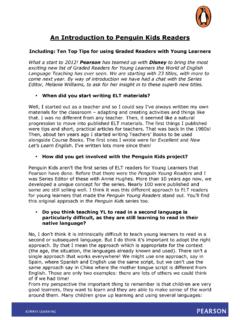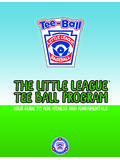Transcription of How to Talk so Kids Will Listen - Child Enrichment …
1 A Letter to ReadersThe last thing we ever thought we d be doing was writing a how to book on communication skills for parents. The relationship between each parent and Child is a very personal and private matter. The idea of giving anyone instructions on how to talk in such a close relationship just didn t feel right to us. The more we talked about it, the more comfortable we became with the idea. Why not a how to book with exercises so that parents could teach themselves the skills they wanted to know?
2 Why not a book with hundreds of examples of helpful dialogues so that parents could adapt this new language to their own personal style?Suddenly our original uneasiness about writing a how to book vanished. Every other area of science has its skill books. Why not one for parents who want to learn how to talk so their kids will Listen , and Listen so their kids will talk?Chapter 1: Helping Children Deal with Their FeelingsWhen I m upset or hurting, the last thing I want to hear is advice, philosophy, psychology, or the other fellow s point of view.
3 That kind of talk only makes me feel worse than let someone really Listen , let someone acknowledge my inner pain and give me a chance to talk more about what s troubling me and I begin to feel less upset, less confused, more able to cope with my feelings and my process is no different for our children. They too can help themselves if they have a listening ear and an empathic response. But the language of empathy does not come naturally to us. It s not part of our mother tongue. Most of us grew up having our feelings denied.
4 To become fluent in this new language of acceptance, we have to learn and practice its methods. How to Talk So kids will Listen & Listen So kids will TalkAuthors: Adele Faber and Elaine MazlishPublisher: HarperCollins PublishersRelease Date: December 2004 ISBN: 978-0-380-81196-0 Adele Faber and Elaine Mazlish are internationally acclaimed, award-winning experts on adult- Child communication. Both lecture nationwide, and their group workshop programs are used by thousands of groups throughout the world to improve communication between children and summarizes significant parenting, marriage, and family relationship books for today s busy families.
5 This summary is comprised solely of selected excerpts from the book. The opinions expressed are those of the book s author(s) and not necessarily those of FamilyIntel. To receive your free summary each week, visit Volume 1, Issue 2 Here are some ways to help children deal with their of half-listening, Listen with full attention. It can be discouraging to try to get through to someone who gives only lip service to listening. It s much easier to tell your troubles to a parent who is really listening. He doesn t even have to say anything.
6 Often a sympathetic silence is all a Child of questions and advice, acknowledge with a word Oh .. Mmm .. I see. It s hard for a Child to think clearly or constructively when some-one is questioning, blaming, or advising her. There s a lot of help to be had from a simple Oh .. umm .. or I see. Words like these, coupled with a caring attitude, are invitations to a Child to explore her own thoughts and feelings, and possibly come up with her own of denying the feeling, give the feeling a name. The Child who hears the words for what he is experiencing is deeply comforted.
7 Someone has acknowledged his inner experience. ( That sounds frustrating! ) of explanation and logic, give a Child his wishes in fantasy. When children want something they can t have, adults usually respond with logical explanations of why they can t have it. Often the harder we explain, the harder they protest. Sometimes just having some-one understand how much you want something makes reality easier to bear. ( I wish I could make the banana ripe for you right now! )So there you have it four possible ways to give first aid to a Child in distress: by listening with full attention, by acknowledging his feelings with a word, by giving a name to his feelings, by granting him his wishes in more important than any words we use is our attitude.
8 If our attitude is not one of compassion, then whatever we say will be experienced by the Child as phony or manipulative. It is when our words are infused with our real feelings of empathy that they speak directly to a Child s s probably obvious to you by now that dealing with feelings is an art, not a science. Yet we have faith (based upon years of observation) that parents, after some trial and error, can master the art. You ll sense after a while what is helpful to your individual Child and what isn t.
9 With practice you ll soon discover what irritates and what comforts; what creates distance and what invites intimacy; what wounds and what heals. There is no substitute for your own Children usually object when their exact words are repeated back to them. There are youngsters who prefer not talk at all when they re upset. For them, Mom or Dad s presence is comfort enough. Some children become irritated when they express an intense emotion and their parent s response is correct, but cool. It s also not helpful when parents respond with more intensity than the Child feels.
10 Children don t appreciate having the names they call themselves repeated by their parents. How to Talk So kids will Listen & Listen So kids will Talk 2 ParenthoodChapter 2:Engaging CooperationOne of the built-in frustrations of parent-hood is the daily struggle to get our children to behave in ways that are acceptable to us and to society. Part of the problem lies in the conflict of needs. The adult need is for some semblance of cleanliness, order, courtesy, and routine. The children couldn t care less.






